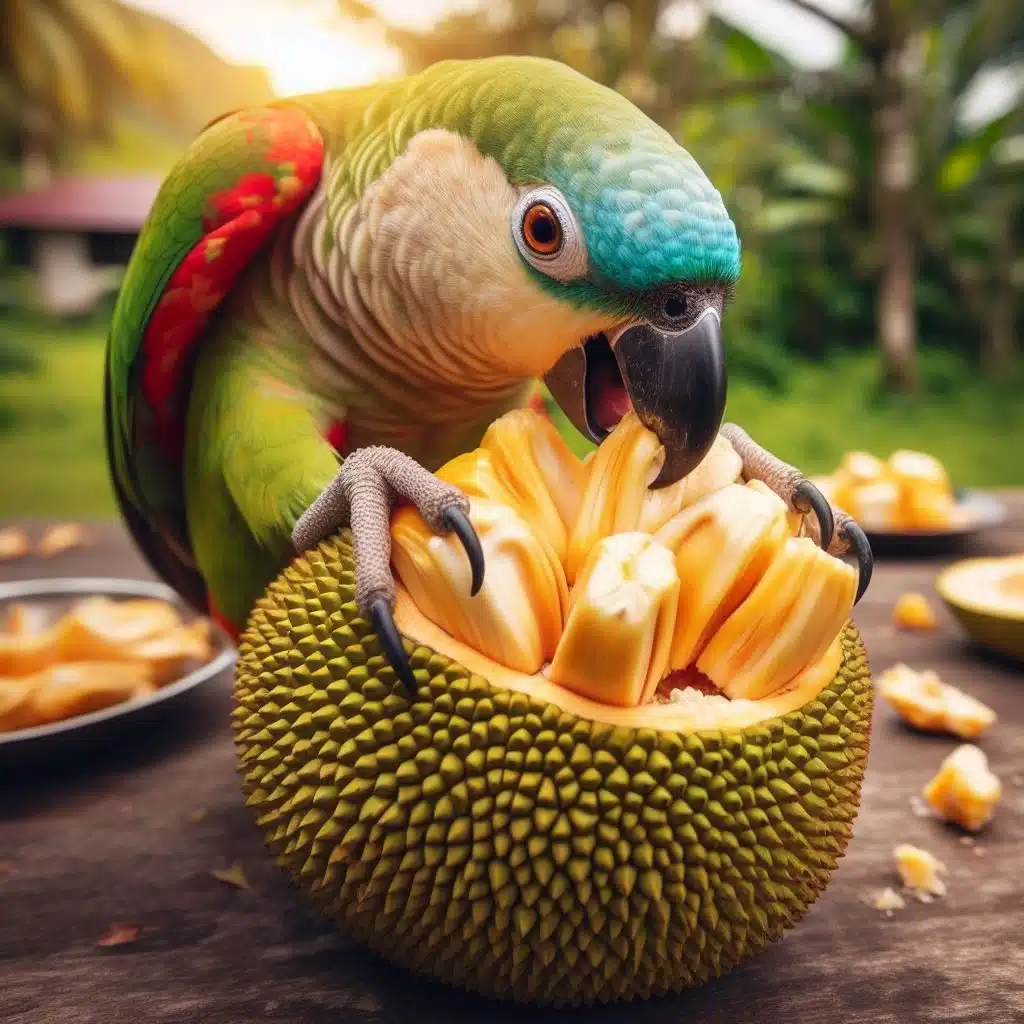It’s important to add foods into your parrot’s diet that pack a bunch of vitamins but also be delicious at the same time. One food that fits this criteria for my bird is jackfruit. Native to South India and growing in popularity jackfruit is one of my parrot’s favorite fruits.
It has a subtly sweet but fruity flavor that’s compared to apples, pineapples, and mangoes. So if your pet likes these fruits then I’m sure they will think the same of jackfruit.
The reason you are on this page is to find out if jackfruit is safe for your parrots to eat although you probably already know the answer from my enthusiasm.

Can parrots eat jackfruit? Yes, parrots can eat jackfruit it’s a delicious snack for them to enjoy all while having almost every vitamin and nutrient you can think of. Jackfruit contains vitamin A, vitamin C, potassium, and manganese and is also a great source of carbs and fiber. Therefore not only is jackfruit safe to eat but it’s also recommended that you feed it to your parrot.
Keep reading on as I’ll discuss in detail the benefits, the seeds safe, and some other important information you need to be aware of as a parrot parent.
Jackfruit Benefits For Parrots
We know jackfruit is good for our Parrots, but just how good is it? Let’s take a closer look at the nutritional content.
One cup of sliced fruit provides the following nutrients :
| Calories | 155 |
| Protein | 3g |
| Carbs | 40g |
| Fiber | 3g |
Carbs
The majority of calories in jackfruit comes from carbs alone with a massive 40 grams in one cup. Carbohydrates are responsible for giving your parrot that much-needed energy so they can play with you and just be active in general.
They also contribute to better brain, heart, kidney, and central nervous system health.
Fiber
Fiber is a type of carbohydrate that aids in the digestive process, keeps your parrot full for longer, and lowers cholesterol. It’s also important for your parrot’s gut health.
It also plays a role in a variety of different functions that go on inside your bird’s body :
- Weight control
- Blood control sugar level control
- Better bowel movement
- Might help your parrot live longer
Strawberries, apples, raspberries, bananas, carrots, beets, brussels sprouts, kale, and lentils are all good sources of fiber.
Vitamin A
Vitamin A deficiency is quite common in parrots and may be caused due to things like a diet that is mainly made up of seeds, not providing enough pelleted foods that contain enough nutrients and not giving your parrot enough fruits and vegetables.
The benefits of vitamin A include :
- Better eyesight
- Bones and mucus membranes support
- Improved eye health
- Supports a healthy immune system
Without enough vitamin A your parrot is susceptible to lack of growth, respiratory diseases along with skin & feather issues.
The symptoms of vitamin A deficiency to look out for are :
- Bad breath
- Nasal discharge
- Sneezing
- Lack of appetite
- Swollen eyes
- Tiredness
To prevent your pet from experiencing a vitamin A deficiency you can feed them foods with high levels of it like red peppers, broccoli, spinach, cantaloupe, and mango.
Potassium
Potassium is also in jackfruit. It plays an important role in the function of your parrot’s heart, kidneys, muscles, and nervous system. A diet high in potassium may also reduce blood pressure and give your bird a stronger bone density.
If you need any other suggestions for foods high in potassium you can feed your parrot things like apricots, lentils, bananas, and baked potatoes. All these foods are safe for your parrot to consume and contain some of the highest potassium levels.
Vitamin C
Also found in jackfruit is vitamin C, great for boosting your parrot’s immune system, and beneficial to your bird’s cardiovascular health.
Parrots with a vitamin C deficiency show themselves with your pet displaying self-mutilation behaviors like tearing their feathers out, preening, and chewing the tips of their feathers.
To prevent this feed your parrot foods high in vitamin C like peppers, kiwis, strawberries, broccoli, and citrus fruits.
Manganese
Manganese is a vital mineral for brain and nerve function. It also helps with fat and carbohydrate metabolism and helps your parrot absorb calcium and blood sugar regulation.
How You Should Feed Jackfruit To Your Parrot
Preparing jackfruit isn’t a clean job so expect to get a little bit messy to feed your parrot this exotic fruit. Divide the jackfruit in half by cutting around the skin and then breaking the two halves apart. Pull out the bulbs of flesh and take out the large seeds (your parrot shouldn’t eat the seeds).
If the thought of cutting up this large fruit sounds like too much work you can always buy it from stores where the hard work has already been done for you. Just be wary of additives and other processed things that will take away from the nutrients that organic provides.
What Other Foods Can Your Parrot Eat?
You know jackfruit is safe for your Parrot to eat but if you’re like me then you’re always looking for new foods to improve your Parrot diet to create some variety and and include vital things that aren’t already in your bird’s diet.
So what other foods can your Parrot eat?
- Fruit & Vegetables
Foods like asparagus, broccoli, carrots, peppers, bananas, blueberries, and pineapples are all fine and encouraged for your Parrot to eat.
- Nuts
Things like almonds, Brazil nuts, cashews, hazelnuts, pistachios, and walnuts can be fed to your parrot. Just be wary of the fat content in some of them so they may need to be treated as a snack for your Parrot. We don’t want them getting fat!
Jackfruit For Parrots – Final Thoughts
I hope by the end of this article you know that jackfruit is a wonderful snack for your parrot to have, although as it’s a fruit don’t feed your bird it too often as fruits and vegetables should only make up around 15-20% of your feathered friend’s diet.
I hope your parrot enjoys this new addition to his diet!






